
People
Fellows
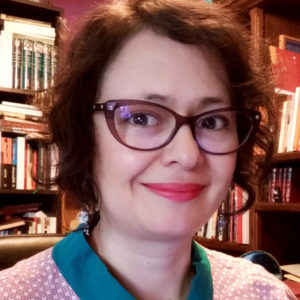
Libia Brenda
Libia Brenda is a Mexican editor, writer and translator, two-time Hugo Award Nominee (she was the first Mexican woman to be nominated for a Hugo), and a Climate Imagination Fellow with Arizona State University’s Center for Science and the Imagination. She writes speculative fiction, mainly short stories, as well as nonfiction and essays about science fiction and fantastic literature. She frequently collaborates with various interdisciplinary and collective projects like the Cúmulo de Tesla collective, a multidisciplinary working group that promotes dialogue between the arts and sciences, and Mexicona: Imaginación y Futuro, among others. Her work has been translated from Spanish into English, Italian, and Portuguese. She is the author of the short story collection De qué silencio vienes and the editor of Odo Ediciones, an independent, nonprofit, and crowdfunded editorial project that publishes science fiction, fantasy, and speculative fiction from Mexico with a pacifist-anarchist and feminist approach.
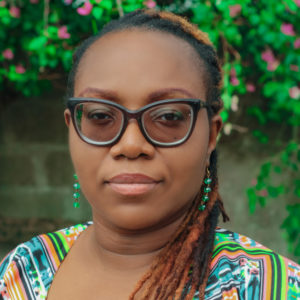
Hannah Onoguwe
Hannah Onoguwe is a writer of fiction and nonfiction based in Yenagoa, Bayelsa State in southern Nigeria, a region famous for its oil industry. Her short stories have been published in the anthologies Imagine Africa 500, from Pan African Publishers; Strange Lands Short Stories, from Flame Tree Press; and The Newlyweds’ Widow, from Mukana Press. Her work has appeared in publications including Adanna, The Drum Literary Magazine, Omenana, Brittle Paper, The Stockholm Review, and Timeworn Literary Journal. In 2014, Cupid’s Catapult, her collection of short stories, was one of ten manuscripts chosen to kick off the Nigerian Writers Series, an imprint of the Association of Nigerian Authors (ANA). She is the winner of the ANA Bayelsa State Poetry Competition in 2016, and was shortlisted for the Afritondo Short Story Prize in 2020. She holds a bachelor’s degree in psychology from the University of Ibadan and a master’s degree in organizational psychology from the University of Jos. She works at a software company, providing support for the Nigeria Immigration Service.
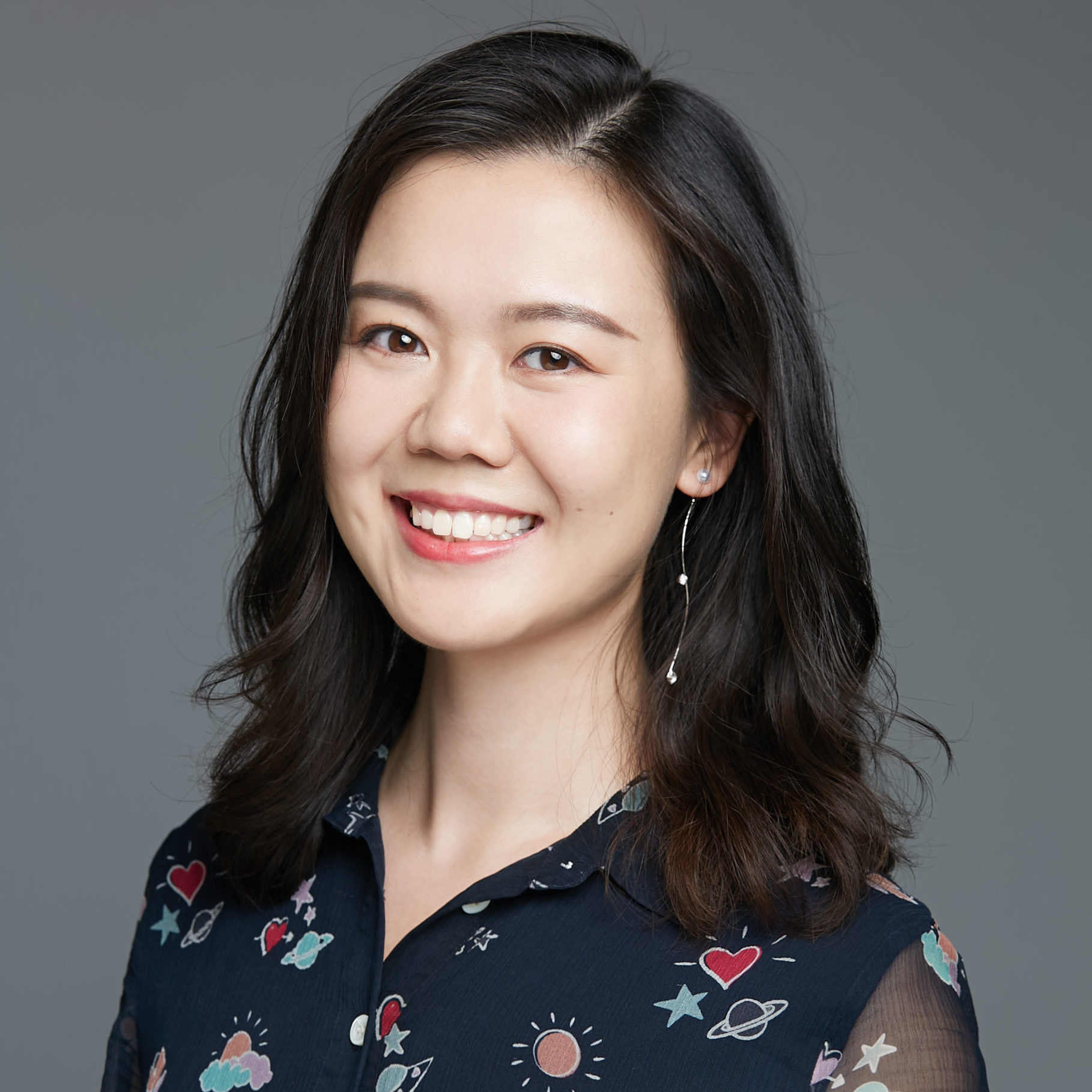
Gu Shi
Gu Shi (pen name of Gu Zongpei) is a speculative fiction writer and a senior urban planner. She has been working as a researcher at the China Academy of Urban Planning and Design since 2012. Her short fiction works have won two Galaxy Awards for Chinese Science Fiction and three Chinese Nebula (Xingyun) Awards. She published her first story collection, Möbius Continuum, in 2020. Her stories have appeared in English translation in the collections Book of Beijing (2023), Sinopticon (2021), The Way Spring Arrives (2021), Broken Stars (2019), Clarkesworld magazine, and Current Futures, XPRIZE’s science fiction ocean anthology (2019). Her stories have also been translated into Italian, Japanese, German, Romanian, and other languages.
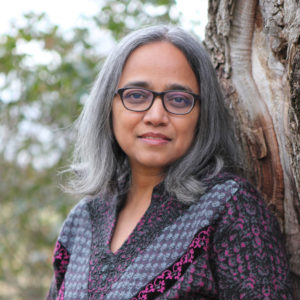
Vandana Singh
Vandana Singh is an author of speculative fiction, a professor of physics at Framingham State University, and a transdisciplinary scholar of the climate crisis. She is the author of two short story collections, The Woman Who Thought She Was a Planet and Other Stories (2014) and the Philip K. Dick Award finalist Ambiguity Machines and Other Stories (2018). Her recent work includes a chapbook of essays and stories, Utopias of the Third Kind (2022). Her academic work on a justice-centered, transdisciplinary conceptualization of the climate crisis has resulted in a book, Teaching Climate Change: Science, Stories, Justice, forthcoming from Routledge in January 2024. Her short fiction has been widely published, including the short story “Widdam,” part of the interdisciplinary climate-themed collection A Year Without a Winter (2019). She was born and brought up in New Delhi, India, and now lives near Boston, Massachusetts.
Project Collaborators

Xia Jia
Xia Jia (pen name of Wang Yao) is a speculative fiction author and associate professor of Chinese Literature at Xi’an Jiaotong University. Seven of her short stories have won the Galaxy Award, China’s most prestigious science fiction award. She has published a fantasy novel, Odyssey of China Fantasy: On the Road, and four collections of science fiction stories: The Demon-Enslaving Flask (2012), A Time Beyond Your Reach (2017), Xi’an City Is Falling Down (2018), and A Summer Beyond Your Reach (2020), her first collection in English. Her stories have appeared in English translation in Nature and Clarkesworld magazine. Her nonfiction academic collection, Coordinates of the Future: Discussions on Chinese Science Fiction in the Age of Globalization, was published in 2019. She is also involved in science fiction research, translation, screenwriting, editing, and teaching creative writing, and is currently working on a new science fiction book, titled Chinese Encyclopedia.
Senior Advisor
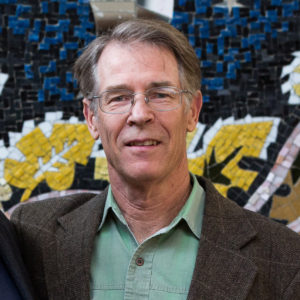
Kim Stanley Robinson
Kim Stanley Robinson is a New York Times bestseller and winner of the Hugo, Nebula, and Locus awards. He is the author of more than twenty books, including the bestselling Mars trilogy and the critically acclaimed Green Earth, 2312, and Aurora. His work has been translated into 25 languages. His most recent novel, The Ministry for the Future, imagines a new transnational agency that advocates for the rights of future generations amidst escalating climate chaos, with a particular focus on radical technological interventions to address collapsing glaciers and other tipping-point phenomena, and on restructuring the world’s economic system with a new set of constraints and incentives. He was sent to the Antarctic by the U.S. National Science Foundation’s Antarctic Artists and Writers’ Program in 1995, and returned as part of their Antarctic media program in 2016. In 2008, he was named a “Hero of the Environment” by Time magazine, and he works with the Sierra Nevada Research Institute and the Clarion Writers’ Workshop. He lives in Davis, California.
Staff

Ed Finn, Project Director
Ed Finn is the founding director of the Center for Science and the Imagination at Arizona State University, where he is an associate professor in the School for the Future of Innovation in Society and the School of Arts, Media and Engineering. He also serves as the academic director of Future Tense, a partnership between ASU, New America and Slate Magazine, and a co-director of Emerge, an annual festival of art, ideas and the future. Ed’s research and teaching explore the workings of imagination, digital culture, creative collaboration, and the intersection of the humanities, arts and sciences. He is the author of What Algorithms Want: Imagination in the Age of Computing (2017) and co-editor of Future Tense Fiction (2019), Frankenstein: Annotated for Scientists, Engineers and Creators of All Kinds (2017), and Hieroglyph: Stories and Visions for a Better Future (2014). He completed his PhD in English and American Literature at Stanford University in 2011 and his bachelor’s degree at Princeton University in 2002.

Joey Eschrich, Project Manager
Joey Eschrich is the managing editor at the Center for Science and the Imagination at Arizona State University, and assistant director for Future Tense, a partnership of ASU and New America on emerging technology, policy, and society. He has coedited several books of science fiction and nonfiction, including Future Tense Fiction (2019), A Year Without a Winter (2018), Cities of Light (2021), created in collaboration with the U.S. National Renewable Energy Laboratory, and Visions, Ventures, Escape Velocities (2017), which was supported by a grant from NASA. He edits Imaginary Papers, a quarterly newsletter on science fiction worldbuilding, futures thinking, and imagination, and hosts CSI Skill Tree, a series that explores how video games envision the future and build rich, thought-provoking worlds. In collaboration with ASU’s Virginia G. Piper Center for Creative Writing, he led Everything Change, a series of global climate fiction contests between 2016 through 2020 that led to the publication of three anthologies.